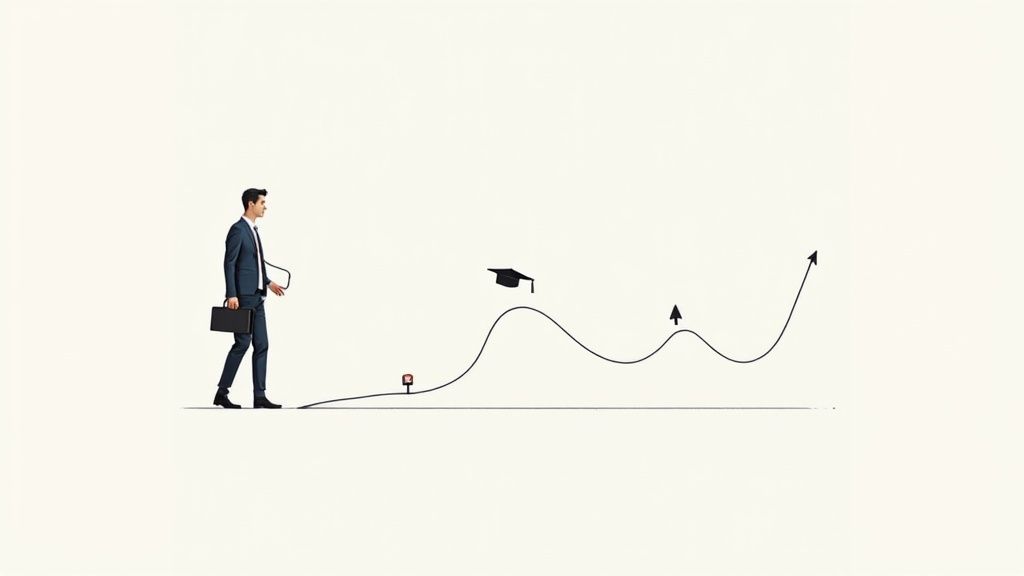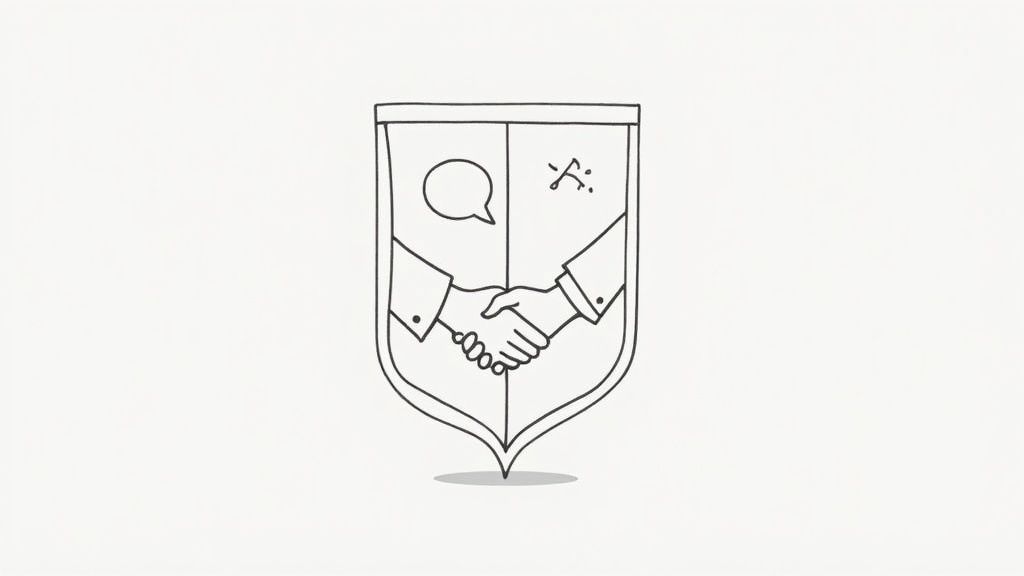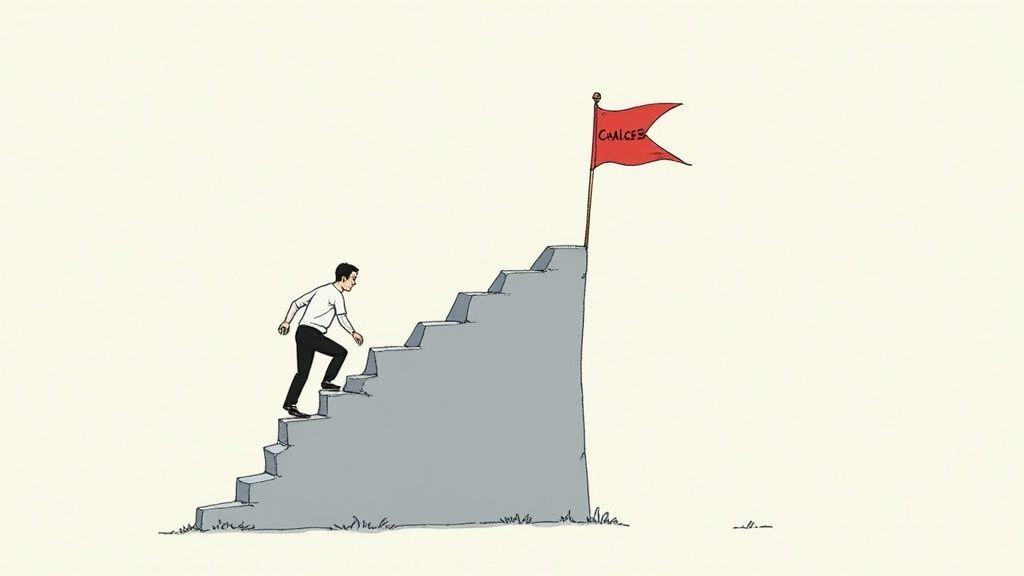
9 Common Entry Level Interview Questions for 2025
Stepping into your first professional interview can feel like a high-stakes performance where every answer counts. The questions may seem straightforward, but they are carefully designed to reveal your potential, assess your personality, and gauge your professionalism. Knowing how to navigate these conversations is the key to turning an opportunity into a job offer. This guide is built to do more than just list the most common entry level interview questions; it’s designed to give you a strategic advantage.
We will break down what recruiters and hiring managers are really asking when they prompt you to “tell me about yourself” or describe your greatest weakness. For each question, you will find structured frameworks to help you craft compelling, authentic answers that highlight your unique skills and ambitions. You’ll learn how to transform generic responses into memorable stories that demonstrate your value.
This comprehensive roundup moves beyond basic advice, providing actionable tips and sample answers that you can adapt to your own experience. By understanding the strategy behind these critical questions, you can walk into any interview room with the confidence needed to showcase your strengths and prove you are the right person for the role. This is your blueprint for a successful career launch.
1. Tell me about yourself
This classic opener is more than just an icebreaker; it’s your first chance to make a strong impression. Often considered one of the most fundamental entry level interview questions, it sets the tone for the entire conversation. The interviewer is looking for a concise, compelling summary of your professional journey and how it aligns with the role you’re seeking.

Why it’s asked and what they’re looking for
Interviewers use this question to gauge your communication skills, confidence, and self-awareness. They want to see if you can articulate your story in a structured way, highlighting experiences that are directly relevant to their needs. This isn’t a request for your life story; it’s a strategic opportunity to present your professional “elevator pitch.”
How to structure your answer
The “Present-Past-Future” framework is a highly effective way to structure your response, keeping it organized and impactful.
- Present: Start with your current situation. For a new graduate, this could be your recent degree and key academic specializations. For a career changer, mention your current role and the transition you’re making.
- Past: Briefly touch on relevant past experiences. Highlight 1-2 key internships, projects, or achievements that demonstrate the skills required for the job. Connect them directly to the job description.
- Future: Conclude by explaining why you are excited about this specific opportunity and how it aligns with your future career goals. This shows genuine interest and forward-thinking.
Pro Tip: Keep your response between 60 to 90 seconds. Practicing your answer out loud will help you sound natural and avoid rambling, ensuring you hit the key points without losing the interviewer’s attention. This polished delivery is crucial for acing common entry level interview questions.
2. Why do you want to work here?
This question goes beyond your resume to uncover your motivations. Interviewers ask this to determine if you’ve done your homework and are genuinely interested in their company, not just any job. Your answer reveals your level of commitment, cultural fit, and whether your personal goals align with the organization’s mission, making it a critical part of most entry level interview questions.

Why it’s asked and what they’re looking for
Hiring managers use this question to weed out candidates who are mass-applying and to find those who are truly enthusiastic about the specific role and company. They are looking for evidence of thoughtful research, a connection to their company values, and a clear understanding of how you see yourself contributing to their team. A strong answer shows you envision a future with them.
How to structure your answer
A compelling response should be a blend of sincere flattery and professional ambition, connecting your skills and aspirations directly to the company.
- Show You’ve Done Research: Start by mentioning something specific that impresses you. This could be a recent project, a company value you admire, or their innovative approach in the industry. For example, “I was impressed by your recent initiative to use sustainable materials, which aligns with my passion for environmental science.”
- Connect to Your Goals: Explain how the role fits into your career path. Mention specific aspects of the job description that excite you and how they will help you grow professionally while contributing to the company’s success.
- Emphasize a Shared Vision: Conclude by reiterating your enthusiasm for the company’s mission and culture. Show that you want to be part of their future, not just fill a vacant position. Much like tailoring your resume, customizing your answer here is key, a skill that is also crucial when you learn how to write a cover letter.
Pro Tip: Avoid generic answers like “I need a job” or “I’ve heard you pay well.” Instead, reference specific details from their website’s “About Us” page, recent press releases, or even LinkedIn posts from current employees to demonstrate authentic interest.
3. What are your greatest strengths?
This is one of the most common entry level interview questions and an excellent opportunity to highlight your most valuable attributes. The interviewer wants to know if your skills align with the needs of the role and the company culture. It’s a chance to demonstrate self-awareness and show that you understand what it takes to succeed in the position.

Why it’s asked and what they’re looking for
Hiring managers ask this to directly assess your qualifications and confidence. They are looking for more than just a list of adjectives; they want evidence. Your answer should be a compelling, evidence-backed statement that showcases your suitability and demonstrates how your abilities can directly benefit their team.
How to structure your answer
A strong answer identifies a relevant strength, provides a concrete example, and connects it to the job. Aim to highlight 2-3 key strengths that are explicitly mentioned or implied in the job description.
- Claim: Start by clearly stating your strength. For instance, “I am an adaptable and quick learner.”
- Evidence: Provide a specific, concise example that proves this strength. You could describe a time you had to master new software for a project or pivot your approach in a team setting.
- Benefit: Conclude by explaining how this strength will add value to their company. For example, your adaptability means you can quickly become a productive member of the team and take on new challenges with ease.
Pro Tip: Use the STAR method (Situation, Task, Action, Result) to frame your examples. This structured approach helps you tell a clear and impactful story, making your strengths more memorable and believable to the interviewer. Avoid generic clichés like “I’m a hard worker.”
4. What is your greatest weakness?
This classic question is often dreaded, but it’s a powerful opportunity to demonstrate self-awareness, honesty, and a commitment to professional growth. When interviewers pose this common entry level interview question, they aren’t trying to catch you; they’re assessing your character and your ability to learn and develop.
Why it’s asked and what they’re looking for
Interviewers ask this question to gauge your honesty and humility. They want to see if you can identify a genuine area for improvement and, more importantly, what steps you are actively taking to address it. A strong answer shows maturity and a proactive mindset, which are highly valued in any entry-level candidate.
How to structure your answer
A well-structured response will acknowledge a real weakness, explain the steps you’ve taken to improve, and show the positive results of your efforts.
- Acknowledge the Weakness: Start by honestly stating a real, but not job-critical, weakness. For example, you might mention a past struggle with public speaking or a tendency to get bogged down in project details.
- Explain Your Actions: Detail the specific actions you have taken to work on this weakness. This is the most crucial part of your answer. If you struggled with public speaking, mention joining a club like Toastmasters or volunteering to lead team presentations.
- Show Positive Results: Conclude by sharing the progress you have made. Explain how your efforts have led to improvement and how you plan to continue developing in this area. This turns a potential negative into a story of growth.
Pro Tip: Avoid clichés like “I’m a perfectionist” or “I work too hard.” These answers sound disingenuous and fail to show true self-reflection. Instead, choose a genuine weakness and focus your answer on the positive actions you’ve taken to overcome it.
5. Where do you see yourself in five years?
This forward-looking question is a staple in entry level interviews and is designed to assess your career ambitions and long-term planning. Interviewers aren’t looking for a definitive life plan, but rather an indication of your drive, your goals, and whether those aspirations align with the opportunities available at their company. A thoughtful answer can signal your potential for growth and long-term commitment.

Why it’s asked and what they’re looking for
Hiring managers use this question to gauge your potential for retention and to understand if you are a good long-term investment. They want to see that you have thought about your future and that your goals are realistic. It helps them determine if you see this role as a stepping stone to something unrelated or as a foundational part of your desired career path.
How to structure your answer
A strong answer demonstrates ambition while grounding your goals in the context of the role you’re applying for. Focus on learning, growth, and contributing to the company.
- Focus on Skill Development: Start by expressing your desire to master the core responsibilities of the entry-level position. Mention specific skills or technologies you want to become an expert in, especially those listed in the job description.
- Show Growth Ambition: Talk about taking on more responsibility over time. For example, you might aim to lead a small project, mentor a new team member, or contribute to more strategic initiatives within the department.
- Align with the Company: Connect your aspirations directly to the company. Explain how you see yourself growing with them and contributing to their long-term success. For instance, “I hope to have developed deep industry expertise that allows me to contribute to key projects for the company.”
Pro Tip: Frame your answer around professional growth and increasing contributions rather than specific job titles. Saying “I want your job” is a classic mistake. Instead, focus on the skills and responsibilities you want to acquire, showing you are both ambitious and a team player.
6. Why are you leaving your current job? (or) Why did you leave your last job?
While this question might seem direct, it’s a crucial one for hiring managers trying to understand your career motivations and professional demeanor. This is one of the more telling entry level interview questions because it reveals your attitude towards past experiences and what you’re seeking in your next role. Your answer helps them assess if your goals align with the opportunities they offer.
Why it’s asked and what they’re looking for
Interviewers ask this to uncover your reasons for moving on and to spot potential red flags. They want to ensure you aren’t leaving due to poor performance, difficulty with colleagues, or other issues that might resurface. They are looking for a positive, forward-looking candidate who is making a strategic career move, not just escaping a bad situation.
How to structure your answer
A successful answer avoids negativity and frames your departure as a step toward future growth. Honesty is key, but it must be paired with professionalism and diplomacy.
- Focus on the Future: Start by explaining what you are moving toward, not what you are running from. Emphasize the appeal of the new role and company. For example, mention seeking greater growth opportunities or looking for new challenges after mastering your current responsibilities.
- Stay Positive: Never speak negatively about a previous employer, manager, or colleagues. Complaining is a major red flag and reflects poorly on your professionalism.
- Connect to the New Role: Link your reasons for leaving directly to what this new job offers. If your previous role lacked opportunities for skill development in a specific area, explain how this new position provides exactly that.
Pro Tip: Frame your answer around professional growth. A great response could be, “I’ve learned a great deal in my current role, but I’m looking for an opportunity where I can contribute more significantly to [specific area] and develop my skills in [a skill relevant to the new job], which this position seems to offer.”
7. Do you have any questions for me?
This is often the final question in an interview, but it’s far from a formality. It’s a critical opportunity for you to demonstrate your engagement, curiosity, and genuine interest in the role and company. Answering “no” is a significant missed opportunity, while thoughtful questions can leave a lasting positive impression on the hiring manager.
Why it’s asked and what they’re looking for
Interviewers ask this to gauge how seriously you’re considering the position. They want to see if you’ve done your research beyond a quick glance at their website and if you’re actively trying to determine if this is a good mutual fit. Your questions reveal your priorities, your level of strategic thinking, and what truly motivates you. It turns the interview into a two-way conversation.
How to structure your questions
Prepare 5-7 thoughtful questions in advance, as some may be answered during the interview. Focus your inquiries on the role, the team, and the company culture to show you’re thinking about your potential contribution and long-term success.
- About the Role: Ask about expectations and what success looks like. For example, “What would a successful first six months in this role look like?” or “What are the key performance indicators for this position?”
- About the Team: Inquire about team dynamics and collaboration. You could ask, “What are the biggest challenges the team is currently facing?” or “How does the team collaborate on projects?”
- About the Culture: Show interest in your growth and the work environment. Try, “What opportunities are there for professional development and training?” or “How does the company measure and reward performance?”
Pro Tip: Avoid asking about salary, benefits, or anything easily found online in the initial interview. Save those for later stages. Your goal here is to demonstrate intellectual curiosity and a deep interest in making a meaningful contribution to the team. This is a key part of navigating common entry level interview questions. Learn more about effective communication strategies, including how to follow up after the interview.
8. Describe a challenge you faced and how you overcame it
This behavioral question is a staple in entry level interviews because it moves beyond hypotheticals. It’s designed to assess your real-world problem-solving skills, resilience, and ability to learn from difficult situations. The interviewer wants to understand your thought process when faced with adversity and see tangible proof of your capabilities.
Why it’s asked and what they’re looking for
Employers use this question to evaluate how you handle pressure, adapt to unexpected circumstances, and take ownership of problems. They are looking for evidence of critical thinking, creativity, and a proactive mindset. Your answer reveals your work ethic and how you might perform when challenges inevitably arise in the role.
How to structure your answer
The STAR method is the gold standard for structuring your response to behavioral questions like this one, ensuring a clear and compelling narrative.
- Situation: Briefly set the scene. Describe the context of the challenge, such as a difficult team project with conflicting personalities or a tight deadline.
- Task: Explain your specific role and responsibility in that situation. What was the goal you needed to achieve?
- Action: Detail the specific, concrete steps you took to address the challenge. Focus on your contributions and your thought process.
- Result: Conclude by sharing the outcome of your actions. Quantify your success with data if possible and, most importantly, highlight what you learned from the experience.
Pro Tip: Choose a professional challenge that is relevant to the skills required for the job. Avoid personal anecdotes and focus on demonstrating competencies like communication, teamwork, or technical proficiency. A well-structured story that shows growth is key to mastering these types of entry level interview questions.
9. Where do you see yourself in five years?
This forward-looking question is a staple in entry level interviews, designed to understand your career aspirations and whether they align with the company’s trajectory. It’s a test of your ambition, realism, and long-term interest in the role and industry. The interviewer wants to know if you’ve thought about your future and if this position is a logical step in your plan, not just a temporary placeholder.

Why it’s asked and what they’re looking for
Hiring managers ask this to assess your long-term goals and commitment. They are looking for candidates who are ambitious but also realistic. Your answer reveals whether your personal career path meshes with the opportunities the company can offer, which helps them gauge potential employee retention. They want to hire someone who will grow with them, not leave after a year.
How to structure your answer
A great response balances ambition with a focus on the current role. Show them you are invested in growing within their company, not just using it as a stepping stone.
- Emphasize Learning and Growth: Start by expressing your desire to master the responsibilities of the entry-level position. Mention specific skills you want to develop that are relevant to the job.
- Connect to the Company: Tie your five-year goals back to the company. Talk about taking on more responsibility, contributing to larger projects, or perhaps moving into a senior role within the same team or department.
- Show Flexibility: Acknowledge that plans can change. Conclude by reiterating your excitement for the immediate opportunity and your commitment to making a meaningful contribution from day one.
Pro Tip: Avoid overly specific or unrealistic titles like “I want to be a CEO” or “I want your job.” Instead, focus on the skills, responsibilities, and impact you hope to achieve. This shows maturity and a grounded perspective, which is crucial when answering common entry level interview questions.
Key Entry-Level Interview Questions Comparison
| Question | Implementation Complexity 🔄 | Resource Requirements ⚡ | Expected Outcomes 📊 | Ideal Use Cases 💡 | Key Advantages ⭐ |
|---|---|---|---|---|---|
| Tell me about yourself | Low - open-ended, conversational | Minimal - requires candidate prep | Insight into communication skills and priorities | Opening interviews to assess communication and fit | Allows candidate narrative control; breaks ice |
| Why do you want to work here? | Medium - requires company research | Moderate - candidate must research | Gauges motivation and cultural fit | Assessing genuine interest and company alignment | Shows preparation and differentiates candidates |
| What are your greatest strengths? | Medium - self-assessment and examples needed | Moderate - prep for STAR examples | Highlights relevant skills and confidence | Demonstrating qualifications and self-awareness | Opportunity to showcase key qualifications |
| What is your greatest weakness? | Medium - requires honest self-reflection | Moderate - prep for sincere answer | Reveals self-awareness and growth mindset | Testing honesty and development potential | Shows authenticity and commitment to improvement |
| Where do you see yourself in five years? | Medium - requires thoughtful ambition expression | Minimal - planning and research | Assesses career goals and retention potential | Gauging long-term fit and ambition | Demonstrates forward-thinking and goal alignment |
| Why are you leaving your current job? | Medium - needs diplomacy in explanation | Minimal - reflection on past roles | Uncovers motivations and professionalism | Understanding reasons for job change | Opportunity to show growth mindset and professionalism |
| Do you have any questions for me? | Low - candidate driven | Minimal - preparation of thoughtful questions | Shows engagement and strategic thinking | Closing the interview to assess genuine interest | Demonstrates preparedness and helps candidate evaluation |
| Describe a challenge you faced and how you overcame it | High - behavioral with STAR method | Moderate - prep of detailed example | Evaluates problem-solving and resilience | Behavioral competence and critical thinking assessment | Showcases real examples of handling adversity |
From Preparation to Offer: Your Next Steps
Navigating the landscape of entry level interview questions can feel like the final, most daunting hurdle in your job search. However, as we’ve explored, success isn’t about memorizing perfect scripts. It’s about developing a strategic framework for your answers that authentically reflects your unique skills, experiences, and professional aspirations. The goal is to move beyond simply answering questions and start telling a compelling story about who you are and the value you bring.
Think of each question, from “Tell me about yourself” to “Do you have any questions for me?”, as a distinct opportunity. It’s a chance to showcase not just what you’ve done, but how you think, solve problems, and fit within the company’s culture. By preparing thoughtful responses, you transform a nerve-wracking interrogation into a confident, professional conversation.
Key Takeaways for Interview Success
To crystallize your preparation, focus on these core principles derived from our deep dive into common questions:
- Authenticity is Your Anchor: Your personality and genuine experiences are your greatest assets. Hiring managers are looking for a real person, not a robot reciting rehearsed lines. Infuse your answers with your unique voice and real-world examples.
- The S.T.A.R. Method is Your Toolkit: For behavioral questions like describing a challenge, the Situation, Task, Action, Result (S.T.A.R.) method provides a clear and impactful structure. It ensures your stories are concise, relevant, and demonstrate tangible outcomes.
- Research is Your Foundation: A deep understanding of the company, its mission, and the specific role is non-negotiable. This knowledge allows you to tailor every single answer, from explaining “Why you want to work here” to asking insightful questions of your own.
- The Interview is a Two-Way Street: Remember, you are also evaluating the employer. The “Do you have any questions for me?” portion is your chance to gather critical information and demonstrate your engagement and serious interest in the opportunity.
Turning Preparation into Action
Mastering these entry level interview questions is the crucial step that turns an application into an offer. It’s the moment where your resume comes to life. By investing time in thoughtful preparation, you are not just getting ready for a 30-minute conversation; you are building the confidence to articulate your worth clearly and persuasively. This preparation empowers you to handle unexpected questions with grace and prove that you are not just qualified, but the right candidate for the job.
Your journey from applicant to new hire is a process, and a successful interview is the pivotal final stage. Embrace the preparation, trust in your abilities, and walk into that room ready to not just answer questions, but to make a lasting, positive impression.
Before you can ace the interview, your application needs to capture their attention. Streamline your job search and create standout application materials with Jobcamp. Our AI-powered platform helps you generate customized, ATS-friendly resumes and cover letters in minutes, ensuring you land the interviews you deserve. Get started for free at Jobcamp.

